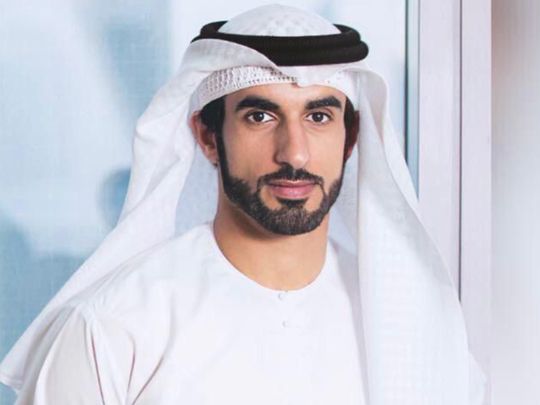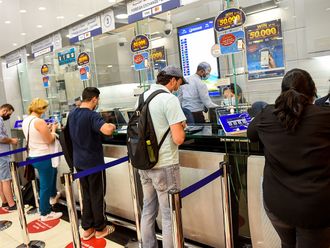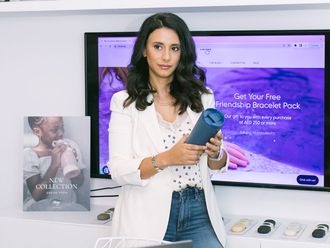
“I have a major love for food and everyone around me knows that I am a foodie and I appreciate good dishes,” shared UAE national Mohamed M. Al Falasi. “It is this passion and love that drove me to start not just one but two of my own food businesses.”
Apart from being a self-professed foodie, Al Falasi is also a young food entrepreneur who had to make a significant shift in his professional career when he decided to take the entrepreneurial plunge.
Over the past decade, Al Falasi held multiple senior positions in government offices, as well as working with auditing giant KPMG, before he ventured into food entrepreneurship to be his own boss in 2017.
With degrees in business and finance, Al Falasi grasped the science of managing personal finances, allowing him to save and financially plan enough to eventually start his own food venture ‘Feels Juice Bar & Kitchen’ without taking any external investment or funding.
It is this passion [for food] and love that drove me to start not just one but two of my own food businesses.
Nourishment, with “good vibes”
The wellness outlet promotes clean eating and healthy living, and serves juices, smoothies and salads, among other dishes, while priding itself for its “good vibes”, with a branch located on Sunset Beach.
“I believe everything is based on an emotional connection - people may not remember what we say, but they will always remember how we made them feel,” said Al Falasi.
However, ‘Feels Juice Bar & Kitchen’, which was launched mid-pandemic, was not Al Falasi’s first entrepreneurial venture. In 2017, the Emirati had started Dubai-based café ‘Saddle’, which makes ‘Feels’ the second business he currently runs and manages.

Feels, not the first entrepreneurial venture
“At the time when we came up with the idea to launch Feels Juice Bar & Kitchen, we had already launched one successful F&B (Food and Beverage Services) brand – Saddle,” said Al Falasi. “So to be able to launch Feels, we saved internally and were able to invest and launch a second brand.
“Through tactful allocation, the money also went into developing the concept of developing a new juice bar and kitchen as well as supporting a studied plan over the year to build the brand.”
Outside the two businesses that he operates, Al Falasi also revealed his four loves: food, sports, sports cars and travelling. This frequent traveller enjoys sampling the local cuisines of the places he visits, as well as playing paddle tennis and cycling during his free time.
How much did it cost you initially to start ‘Feels’?
“My initial start-up investment [for ‘Feels Juice Bar & Kitchen’] came from my personal savings, which I was able to do while working and studying,” said Al Falasi. “To start out we didn’t take any investment.”
Al Falasi estimated his monthly operating costs running into a six-digit figure currently, while ensuring constant monitoring to see to it that overhead costs are not higher than incoming revenue.
“We also have a P&L (Profit and Loss) system in place to ensure all our numbers are monitored, analysed and optimised for future investments and growth,” he added, referring to an income statement that explains the daily fluctuation in income and revenues and the causes of the changes.

Here are three key challenges Al Falasi flags when running food outlets
“Running a successful F&B business is not a simple task. The vision I always worked towards was not opening a restaurant, but it was building a brand that would live on through the years. To that, I faced many challenges,” added Al Falasi.
#1: Figuring out the logistics of setting up a business
Al Falasi said his first challenge was in understanding the logistics and details that go into building an F&B business, while adding that he believes in a food entrepreneur wearing all the different hats required to be able to have 360-degree knowledge and manage the business’ day-to-day operations.
“I had to learn how to develop brand and business strategies and research different recipes and tailor them to people’s taste. I learned how to be a chef, an operations manager, HR (Human Resources), and marketing as well as procurement and finding suppliers,” added Al Falasi.
#2: Initial operational hiccups faced on a daily basis
In the first few years of business, new companies come up against a lot of different challenges. Some are harder than others to overcome — and, according to a global study by CNBC, about 20 per cent of small businesses fail by the end of their first year worldwide.
I had to learn how to develop brand and business strategies and research different recipes and tailor them to people’s taste.
“Setting up the business is one thing; operating it is a whole different world. Adapting and coping with the daily obstacles was another challenge, however these daily challenges taught us how to be flexible and adaptive while coming up with solutions that do not harm or change our operations,” he said.
“Despite the day-to-day challenges that I face, knowing that I have people around me that share a common vision and want my business to grow as much as I do, really motivates me to keep going.”
#3: Building a team that shares the same vision
Over half of respondents to the CNBC study also stated that the most significant problem facing businesses initially was labour quality, which is considered to be a tough statistic to consider, especially since most challenges can’t be overcome without a team that works towards business goals.
“Finding talented people is not hard, being in the UAE we have access to a lot of local and international talents that are very qualified,” Al Falasi explained.
“The challenge that we encountered was building a team that was both talented and shared the same vision for the company. We had to make sure that the people we hired believed in our values and understood what we stand for and aim to do.”

What is your advice to entrepreneurs looking to start a business?
• Start something you are passionate about
Al Falasi: “Passion is the key driver when things get hard. If you don’t have passion for what you are starting, then when times are tough you will lose interest. “
“Being an entrepreneur isn’t for everyone, when times get tough you need to have your own back and follow your gut instinct. Every business has its ups and downs however, if you are truly passionate you will find a way to make it work.”
• Do your homework and study your business idea well
Al Falasi: “Ideas always flow in our brains however to confirm the idea is good and worth it, you must do research about the market and business idea before turning it into something tangible. It is only when you do your due diligence that you will know if the idea is feasible or not.
“The more you do your homework the more you are prepared. If you are entering into a saturated and competitive market, such as F&B, you need to study your competitors and understand how your idea is going to stand out.”
Al Falasi: “It is important to be prepared for any challenge or growth opportunity that may come your way. Whether it is you putting more of your personal money aside for times like this or getting the help of an investor, it is crucial to have backup money outside your original investment.”
Money Lesson #2: Have active and passive stream of income by buying real estate
Al Falasi: “Investing in real estate offers cash flow, tax breaks, equity building, and an inflation hedge. It is very important to have both an active and passive stream of income and I believe real estate is a great passive way of making money.”




_resources1_16a4a1613d8_small.jpg)



